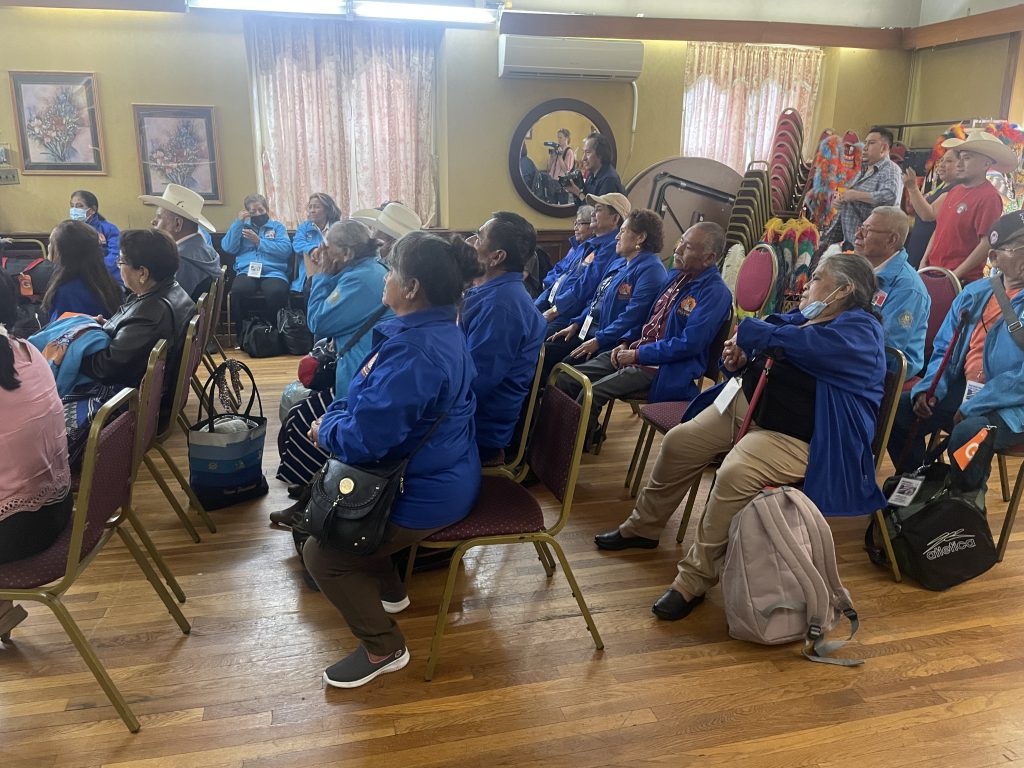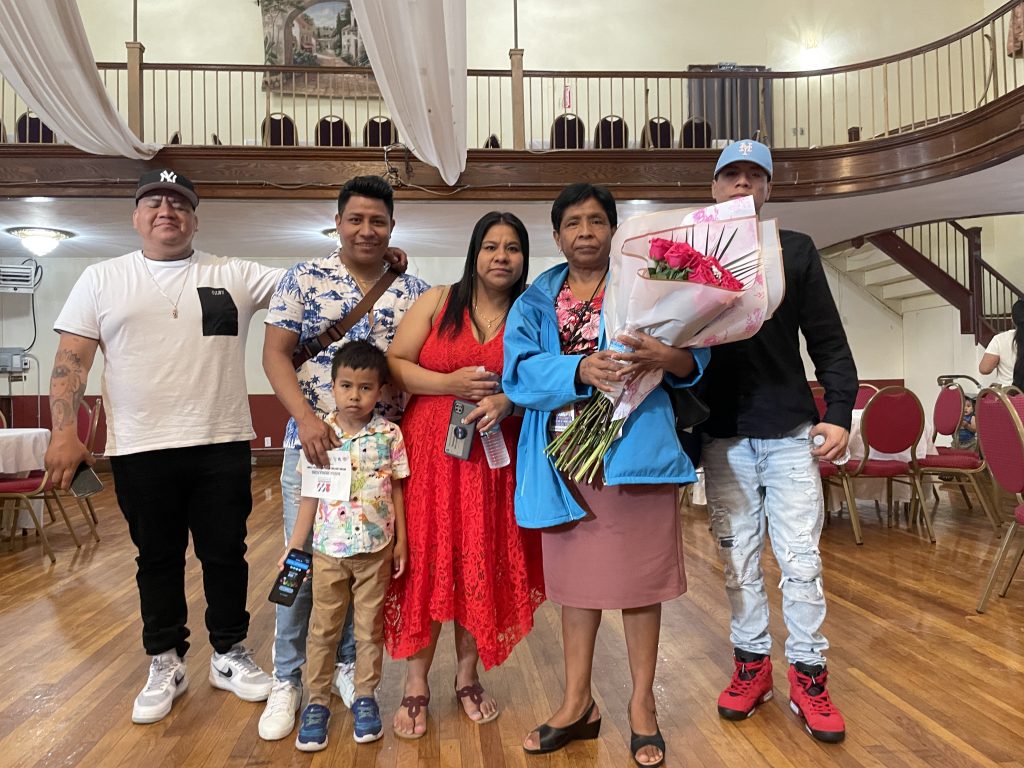At 4 p.m. on Sunday in the banquet hall of the Global Christian Ministries Church in Richmond Hill, Queens, multiple families wait, holding balloons that read “welcome,” and multi-colored bouquets of roses. The families are looking attentively at the entrance door. In a room to the side, thirty elderly adults wearing matching light blue jackets patiently wait for their turn to be brought in.
Also Read: How to Sponsor a U.S. Visa for a Family Member
Then, the voice of Aurora Morales Gil, organizer of the event and founder of El Club Migrante de Chinelos de Morelos en Nueva York, starts calling out names. “The Family of Juana Bustos!”, she says, as an elderly woman walks into the room. All eyes are focused on her, as an emotional man, Daniel Bustos, her son, walks to embrace her for the first time in 20 years.
The Bustos family are participants in the Club Migrante’s family reunification program, which helps undocumented migrants living in New York reconnect with their loved ones from Mexico, who they haven’t seen for decades due to their inability to travel. The organizations assist the older parents in obtaining B1-B2 tourist visas, and organizing a 4-week trip to the United States.
Since arriving in New York City at 21 years of age, Bustos has been unable to travel back to see his family in Hidalgo, Mexico.
“Here I am, thanks to God, with my blessed family,” said Juana Bustos, 63. Traveling to New York was her first time boarding an airplane, let alone leaving Mexico. “I was a little afraid at first,” she said, “but not anymore.”
The Bustos family are one of 7,500 families that the club, founded in 2013 to help migrants from the state of Morelos access their birth certificates, has helped reunite through its reunification program that launched in 2017.
What are family reunification programs and how to apply
“The connection between grandparents and their grandchildren is very strong,” Morales Gil said. Before she became a U.S. citizen she couldn’t travel back to Mexico since entering the country in 1990. She missed her great-grandmother’s funeral, and other family events. “I understand what they are going through,” she said, about immigrants in her community separated from their families. It is one of the reasons why she launched the reunifications program, she said.
Known in Spanish as “reunificaciones familiares,” they are programs organized by nonprofit organizations or Mexican state governments that help parents of Mexican immigrants in the United States, normally over the age of 60, obtain B1-B2 tourist and business visas. The visa allows the parents living abroad to travel to the U.S. for a period of time, allowing them to reunite with their families.
Also Read: What Happens if Your Visa Extension Gets Denied?
Morales Gil, who is also a Citizen Liaison Volunteer with the U.S. embassy in Mexico, said that they are able to help families obtain visas by “assuring the U.S. embassy in Mexico that we will make sure they return back.”
The first trip to the United States lasts for one month and is coordinated by the organization.
Normally, when applying for a B1-B2 visa an applicant needs to show they have the intention of returning home, and the economic means to pay for their trip–both requirements that are taken care of by the organizations.
Mi Casa Es Puebla, with offices in New York and New Jersey, and Casa Tlaxcala in Manhattan, through the Tlaxcala state government, also run similar programs to the Club Migrante Chinelos de Morelos en Nueva York. Mi Casa Es Puebla’s program has benefited 3,776 people since 2016, while Casa Tlaxcala’s program, smaller in scale, has benefited 70. The Mexican consulate has a list of other programs run by organizations and state governments across Mexico.
La Red De Pueblos Trasnacionales, a nonprofit in The Bronx, also runs a program for the families of its members that have completed volunteer work in their communities in Mexico. According to Marco Castillo, the organization’s co-executive director, they’ve brought together 140 families since 2008.
The assistance provided by each organization varies. Mi Casa Es Puebla, for example, will pay for airfare, travel to the U.S. embassy in Mexico City for a visa interview, and processing the visa. El Club Migrante, on the other hand, requires family members to cover the full cost, and act as facilitators with the embassy. It is recommended to contact the organizations to inquire what services are offered.

Who can participate?
These types of programs only exist between the United States and Mexico.
Each program has its own requirements, but generally it requires that the person applying for the visa is over 60 years of age, has never traveled to the United States, and has an unexpired passport, Elisa Muguruza, the director of Mi Casa Es Puebla Passaic, explained.
Some of the programs, like through Mi Casa Es Puebla and Casa Tlaxcala, require the older relative in Mexico to be a resident of a particular geographical region.
How long does it take?
The whole process, from making an initial contact with an organization to receiving your family member in New York City, could take several months, or even years. It all depends on the availability of appointments in the U.S. embassy. There’s still a backlog caused by the COVID-19 pandemic, said Muguruza.
“For three years they weren’t processing visas,” she said, “and just this year they’re restarting it, but we’re not receiving new participants yet until the current group gets through.”
What is a visitor visa?
Program participants typically apply for B1-B2 visas, used for tourism and business trips. They normally are valid for 10 years and allow a person to visit the United States for up to six months at a time.
The visas have a processing fee of $185, and require an in-person interview at the U.S. embassy or consulate in Mexico.
Also Read: How To Check Your Visa Petition, USCIS Case Status and More
Do these programs put undocumented immigrants at risk?
All the organizations Documented spoke to agreed that reunification programs do not put immigrants at risk. “Their status isn’t affected in any way,” said Morales Gil.

Back at the church in Queens, Alma Baltazar, 33, from Morelos, Mexico, awaits her mother’s arrival. She has spent 18 years without seeing her. Her mother, Bonfilia Michaca Flores, was put on a different flight from the rest of the group, due to limited space. “Your mother landed, and she’s on the way,” Gil told her.
When she arrives an hour later, Alma embraces her. They are both in tears. “I’m very excited, very emotional,” she told Documented. “More than anything because as a woman, when I came here at 16 I needed my mom a lot, but couldn’t see her…only through phone calls and text messages.” She did not sleep last night out of excitement, she said.
Her mother was excited to see her too. “It’s very beautiful to see my children after so many years,” she said. Together they shared a meal in the banquet hall, before setting off in a car
Michaca Flores said she was tired. She had been up since one in the morning, so all she wanted to do was rest.
“It was very tiring,” she said, “but now we’re going home.”





